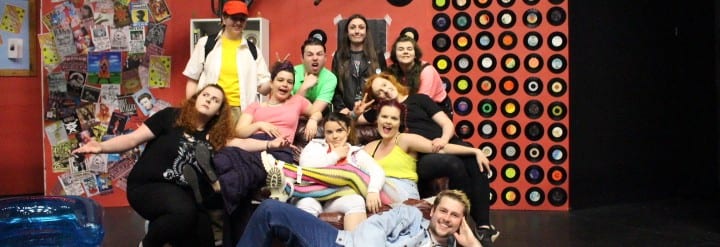Darks Stories and Unique Characters
Every character has its own dark background and its own unique characterisation. Another element that binds the characters at the record shop is that they all have different kinds of dark pasts. Daisy lost his boyfriend and only thing left from him is the record shop. For that reason she doesn`t want to leave the shop. Tiff lost her parents when she was little. She is also homeless.
Alex and Jasmine can only exist with their culture in the record shop. Jasmine is a so called writer and Alex is an unsuccessful musician. Alex has a band called Punch the Llama. . Both characters are making fun of with stereotypes. Jasmine wants to become a well-known and rich author. Alex wants to follow his uncle’s way and become “the new big thing”. Jasmine steals other character’s stories for her book. Because she has nothing else to write. She doesn`t even know her own story. She only writes stories about the record shop. She doesn’t write anything about the real world. The real world doesn’t know her existence. Alex is not only a mediocre musician or does not have a peculiar style, but she has her own ways to cope with capitalism, similar to her band`s name.
“ALEX. It’s not about animal cruelty. The llama is symbolic of the oppressiveness of society. You have the head, and then the long neck, then the body. The head is the establishment and government, and the body is everyone else. The classes are separated by the neck, that’s the hierarchy. We punch the llama to bring the establishment down.”
(Jack Briggs, 2017)
Yet Jasmine did not explore her own history she writes about the other`s dark pasts. Besides she underestimates everybody and in from a wealthy family, she is as hopeless as Alex. Also at the “Dawn of the Hipster” scene, the two characters start to understand each other and begin to have a sort of master- slave relationship.
“JASMINE. I have this. It’s about Tiff. (Starts reading) My mum and dad died in a car crash when I was five. I don’t remember it well, but I remember their faces. They’re just like photographs in my head. She’s always smiling, and his eyes are made larger by his glasses. I wish I knew them better.
ALEX. Did she actually say that?
JASMINE. She did. It’s beautiful.”
(Jack Briggs, 2017)
As Sebastian tires to find his own self throughout the play, he also has dilemmas about sexuality. As he likes David along the play he starts to like Violet at the end of the play. When he leaves the record shop to work in the real capitalist world nobody wants him in the shop. He has to choose. The society or the outsiders. Despite the fact that Sebastian is the one that character who is not liked and the one that frames up to his friends, he becomes the one to save the record shop. That is to say, instead of trying to survive in the capitalist system, he retires into the world`s isolated shell and prefers not to exist.
“SEBASTIAN. We can stay! I fucked with the blueprints.”
(Jack Briggs, 2017)
Violet being and alcoholic and dropped off studying about philosophy, is an important character that emphasizes to the zilch circulation by just speaking but practicing any act throughout the play.
“DAISY. Maybe if you stop drinking all of this, you’ll be successful.
VIOLET. I am successful.
DAISY. Is this why you dropped out of university?
VIOLET. Wine can’t make you drop out of university! Wine makes university bearable!”
(Jack Briggs, 2017)
In spite of the fact that the love between David and Sherice seems romantic at record shop, it does not actually exist in the real world.
“SHERICE. I got a discount at Burger King. That could be nice.
(Jack Briggs, 2017)
As a result even if the characters have dark sides they cannot across the border of circulation and timelessness.
Work Cited:
Briggs, J. (2017) Record ’97. Lincoln
